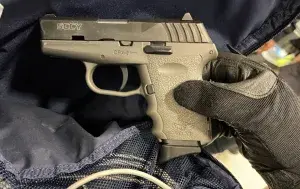
Editor’s note: This limited series explores the Compliance arm of Security Operations: what they do, how they relate to the passengers and why accurate execution of each portion of the process is crucial for the next step’s success.
When TSA officers discover a firearm in a carry-on bag, they tip the first domino in a line of reporting and investigative work that could result in fines, and if the passenger had expedited screening, the loss of the highly valued TSA PreCheck® privilege.
The officer’s job in this good catch ends while others are just beginning to work this incident and the investigation that follows.
TSA inspectors on the Compliance side of TSA Security Operations are alerted in real time when a reportable incident occurs. They later review the information collected from the checkpoint officers and reported by the on-duty supervisors and managers.
“If the evidence collected in a firearms incident — including TSA officer statements, photos and CCTV footage — proves a passenger attempted to enter the sterile area with a firearm, the TSA inspector will cite Title 49 CFR §1540.111(a)(1) and begin a legal process where the person will ultimately receive a civil penalty otherwise known as a fine,” said Houston’s George Bush Intercontinental Airport (IAH) Assistant Federal Security Director – Inspections Chris Rascoe.
Rascoe and his inspectors rely on the accurate documenting skills of checkpoint officers to do their work. If the evidence proves the allegations, TSA sends a Notice of Violation through the U.S. Postal Service.
Reports documenting exactly what the passenger said, even if it is rude, crude, vulgar or disrespectful, is important because those statements could be used as evidence if the case is litigated. Similarly, detailing impacts resulting from the incident, such as checkpoint lane closures, helps inspectors when leveling fines.
Besides prohibited items, inspectors collect evidence on interference with screening, checkpoint exit lane breaches and artful concealment related to checkpoint incidents. They enforce civil matters not criminal matters. TSA doesn’t have to prove intent the way law enforcement does.
“Inspectors rely on preponderance of evidence,” reminds Rascoe. “It has no bearing on our investigation when a passenger states they forgot the prohibited item was in their bag.”
State, city and local laws vary at each airport throughout the country. When law enforcement officers (LEOs) respond to incidents, they assess the situation according to local laws, intent, probable cause and other criminal aspects. The LEO may or may not arrest passengers. They may take possession of the prohibited item or assist TSA in returning the item to the passenger’s vehicle.
“Regardless of the actions the LEO may or may not take, TSA inspectors open investigations to mitigate future occurrences and determine if the passenger’s actions increase risk to the transportation system,” said Rascoe. “TSA inspectors apply the regulatory requirements uniformly across the country, similar to how TSA officers follow their national standard operating procedures.”
Passengers are encouraged to learn about TSA regulations before traveling by checking out the “What Can I Bring” page of TSA.gov or @AskTSA.
By Karen Robicheaux, TSA Strategic Communications and Public Affairs

